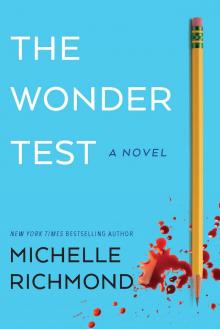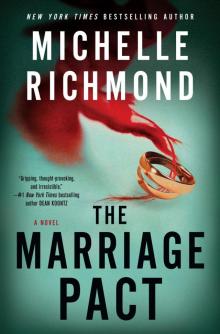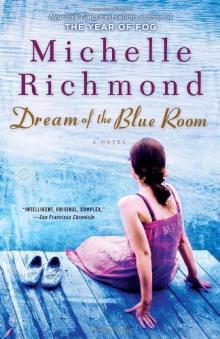- Home
- Michelle Richmond
The Wonder Test
The Wonder Test Read online
THE
WONDER
TEST
Also by Michelle Richmond
Golden State
No One You Know
The Year of Fog
Dream of the Blue Room
The Girl in the Fall-Away Dress
Hum: Stories
The Marriage Pact
THE
WONDER
TEST
A Novel
Michelle
Richmond
Atlantic Monthly Press
New York
Copyright © 2021 by Michelle Richmond
Jacket design by Becca Fox Design
Jacket art © iStock/Getty
All rights reserved. No part of this book may be reproduced in any form or by any electronic or mechanical means, including information storage and retrieval systems, without permission in writing from the publisher, except by a reviewer, who may quote brief passages in a review. Scanning, uploading, and electronic distribution of this book or the facilitation of such without the permission of the publisher is prohibited. Please purchase only authorized electronic editions, and do not participate in or encourage electronic piracy of copyrighted materials. Your support of the author’s rights is appreciated. Any member of educational institutions wishing to photocopy part or all of the work for classroom use, or anthology, should send inquiries to Grove Atlantic, 154 West 14th Street, New York, NY 10011 or [email protected].
Two lines of “Legacy” from In Mad Love and War © 1990 by Joy Harjo. Published by Wesleyan University Press and reprinted with permission.
Epigraph from An Astronaut’s Guide to Life on Earth by Chris Hadfield, copyright © 2013. Reprinted by permission of Little, Brown, an imprint of Hachette Book Group, Inc.
FIRST EDITION
Published simultaneously in Canada
Printed in the United States of America
This book is set in 11.5-pt. Scala LF by Alpha Design & Composition of Pittsfield, NH.
First Grove Atlantic hardcover edition: July 2021
Library of Congress Cataloging-in-Publication data is available for this title.
ISBN 978-0-8021-5850-5
eISBN 978-0-8021-5851-2
Atlantic Monthly Press
an imprint of Grove Atlantic
154 West 14th Street
New York, NY 10011
Distributed by Publishers Group West
groveatlantic.com
for Oscar
When you’re 200 feet above the ground, going 240 knots, you want to know where you are at all times, but it’s easy to get lost on the prairie.
—Chris Hadfield, An Astronaut’s Guide to Life on Earth
Prologue
We ride the elevator in silence, emerging on the third floor. The company has revamped an old warehouse, making stylish use of exposed beams and concrete floors. There are no offices, no cubicles, just a series of cafeterias and conference rooms enclosed in glass walls. We step into a café, quiet save for the clicking of laptop keyboards. Nicole leads us to a dimly lit booth, and Kyle and I slide in side by side.
Nicole returns moments later with three coffees in black cups bearing the company logo. She’s stirring cream into her coffee, avoiding our eyes, when two young men in nearly identical tech uniforms—slim jeans, slimmer shirts, loud socks—pass our table. Nicole covers her face with one hand, but it’s no use. “Missed you at the scrum,” the younger guy says.
Nicole acknowledges him with a nod. I don’t blame her for not wanting to be seen with us.
Kyle takes a red notebook out of his messenger bag and places it on the table. Uncapping his pen, he looks more like an eager college freshman than a police detective.
“I was wondering if you might tell us about that day on the beach,” I begin.
Nicole glances nervously at the notebook, so I slide it off the table into my bag. Her shoulders relax. “All of it?”
“Yes.”
She fidgets with a red string tied around her wrist. “It was a cold, wet morning. I went out to Half Moon Bay to meet someone—”
“Who?”
She pauses, searching for the right words. “A new friend. We parked at the beach.” Nicole’s eyes scan the room. “We ate sandwiches in his car, and then he left. Before heading back into the office, I decided to go for a walk.”
“The day was cold and wet, yet you went for a walk?”
Nicole frowns. “I needed to clear my head. The sandwiches in the car were a bad idea. It didn’t go quite the way I was expecting.”
“Do you often eat sandwiches in the car?” Kyle asks.
Nicole glances at Kyle, annoyed. “It wasn’t my first, but I haven’t had one since.” She turns her focus to me. “I suppose women our age shouldn’t be eating sandwiches in cars.”
“Sometimes one needs a sandwich. Not for me to judge.”
“True.” She almost smiles. “After a few minutes I sat down on a piece of driftwood to take a call from my assistant. There was no one else on the beach.”
Kyle taps his pen on the table. “What did she want, your assistant?”
“He said I needed to get back to the office right away.” Nicole picks at her cuticles, reluctant to say more. I sip my coffee, waiting. Two beats, three. She has green eyes, a few freckles emerging from underneath the makeup. I glimpse the Catholic schoolgirl she once was beneath the trappings of her tech exec exterior.
“My assistant was describing the latest fire I needed to put out when I looked up and saw a shape far down the beach. The figure was moving in an unusual way, slow but jerking, like an injured animal. It was disturbing and mesmerizing at the same time. My first thought was that a space alien had landed in the Pacific and drifted ashore. You know, creature from the black lagoon.”
“Your second thought?” I prod.
“‘How am I going to explain this in the office? How do I justify being on the beach in Half Moon Bay at ten o’clock on a Tuesday morning?’ I wanted to hurry back to my car, but I couldn’t move. I was hypnotized by this thing moving toward me. Shuffle, two, three, four. I’d never seen anyone or anything move that way, not so much a walk as a strange, gyrating groove. The figure was ashen white, glowing. The voice in my head told me to run.”
“Why didn’t you?” Kyle asks.
“It looked so”—she shakes her head—“so helpless. I stood up and walked toward it. My eyesight isn’t great. Until I was about twenty feet away, it still looked like an amorphous blob.”
I wait for her to look up at me. Her eyes are sunken, her face pale. At first, I thought her ravaged expression had come from working insane tech hours, staring at the screen, drowning in coffee, forgetting to eat. Now I understand it’s something else. All these months, she has been haunted by her discovery on the beach.
She finally meets my eyes. I lean forward and ask, “When did you realize it was a boy?”
1
Assuming the universe is always expanding, at what point does it become less likely that you will find your lost keys by continuing to look for them? Diagram and discuss.
In the garage of my father’s house, I find the bike wrapped up on the outer edge of a pallet, the smell of New York City still clinging to it. My son, Rory, is asleep upstairs. Since we moved to Northern California, I’ve been waking earlier and earlier, and Rory has been sleeping later and later. He is growing taller, his voice losing its adolescent scratchiness and settling into a baritone that reminds me of his father.
I cut through the plastic with scissors, nudging the bike free. Cruising down t
he long driveway and out onto the street, I turn my face up to the cold, wet wind. Down the hill, right on Santa Inez, left on El Camino. The momentum carries me, and I lean into the free-falling sensation—rolling effortlessly, barely slowing down at the intersections. The streets are empty, lit by the half moon and the omnipresent glow of the airport five miles south. I pedal faster and faster, into Burlingame, along California Drive, flying through the red lights.
The insomnia struck in adolescence. Even back then, my mind was prone to racing. Insomnia can drive you crazy, or it can just drive you. If not for Rory, asleep there in his warm bed in my father’s house, I would just keep pedaling, race away, somehow escape this awful year, annus horribilis, the Queen would say. I would ride west, up over 92, left along the coast, all the way down Highway 1, pedaling through Southern California, into Mexico, South America, the miles melting away. Maybe I could even go faster than the speed of light, somehow turn back the clock, set things right.
Down Oak Grove, past McKinley School. Only when I turn the corner onto Broadway do I realize where I’m headed. The neon letters of the Royal Donut Shop reflect off the wet street, just as they did so many years ago. I’m surprised to find the sign is still standing, the shop still open. I’m even more surprised to find myself here. The Royal Donut Shop. Again.
In 1989, I was eleven years old, and I had a paper route. I delivered the San Francisco Chronicle to thirty-six homes throughout the Laguna addition. It paid fifty-four dollars per month plus tips. I woke each morning at five, folded papers on our cold doorstep, and rode my bike across the railroad tracks to launch newspapers onto porches before the fine citizens of Burlingame stepped outside in their slippers and bathrobes. Sundays were the toughest. The paper was thick, the bags heavy. After I’d delivered every paper, my load lightened, my arm sore, I would stop at the Royal Donut Shop. It was my favorite moment of the week, sitting alone on the green bench outside with a warm doughnut and a carton of milk, the sun just beginning to rise.
Eventually, I got to know the owner, Mr. Melfoy, and the kid who worked the counter, Vince LaRue. Vince was five or six years my senior, and his younger brother went to my school. I wouldn’t say Vince and I became friends. It wasn’t like that. I rarely talked, and he was busy setting up for the morning rush. But after months of my arriving at the same time Sunday after Sunday, always ordering the same thing, we became familiar. He usually seemed happy to see me, and I was more than happy to see him. He had a way about him, a strange light, a magnetic pull—charisma, I realize now.
One morning, as I walked through the door, Vince took a white paper bag from under the counter. As I made my regular order, I noticed his hands moving rapidly, as if he was doing some sort of magic trick. Then he rang up my glazed old-fashioned and milk—eighty-nine cents. I handed him my money, counted out to the penny, and he handed me the bag, filled to the brim.
“Enjoy,” he said, winking.
Outside, on the bench, I opened the bag and discovered a treasure trove of doughnuts—fancies and plains, raised and cake, even a chocolate French cruller.
The next Sunday and every Sunday thereafter, the same thing happened. To this day, I can still conjure the joy of riding my bike across the railroad tracks, along the freeway sound wall, smiling giddily, leaving a trail of crumbs in my wake. It went on like that for nearly two years. And then one Sunday—by the time I was old enough to have developed a crush on Vince, to wear my hair in a ponytail instead of pigtails, to put on lip gloss—something happened: Vince wasn’t there.
I didn’t say anything to Mr. Melfoy that morning as he bagged my single doughnut and carton of milk. I went outside and sat on the bench, disappointed. Alone, I ate my doughnut, wondering why Vince hadn’t told me he’d be gone. The following Sunday, he was still missing. The third week, I gathered the courage to ask Mr. Melfoy.
“You didn’t hear?”
“No.”
Mr. Melfoy shook his head. “Rafting accident up north. Terribly sad.” Then he handed me my doughnut and returned to the grill.
I didn’t know what to say. I had never known anyone who had died. Until this year, this horrible year, when I lost both my father and my husband in the span of three months, I lived a fairly charmed life. In the past, death always made me think of Vince LaRue—the finality of his absence. Whenever I dealt with it in my work, I would think of him—the sad, sinking feeling I had in the weeks after receiving the news, how I rode my bike past the Royal Donut Shop every Sunday, haunted by the same thought: “Vince LaRue won’t be working at the Royal Donut Shop today.” And it haunts me again this morning, after all these years.
The green bench, now weather-beaten, is still bolted to the patio. I prop up my bike and open the door, the bell jangling a familiar tune. Inside, the aroma of fresh doughnuts hits me. The counter has moved a couple of feet to make way for a Lotto machine, but otherwise, everything is the same.
The young guy behind the counter smiles. “Morning, what can I get you?”
“One raised, one chocolate old-fashioned, and a coffee, please.”
He pours the coffee and rings up the order. I pull three dollars out of my pocket, pleasantly surprised by the bargain.
As he’s handing me the bag, he notices the writing on my sweatshirt. I forgot I was wearing it. Since the move, I’ve had trouble finding clothes in our disorganized piles. “FBI New York,” he reads aloud. “You really FBI?”
“Sixteen years. Taking a little break, though.” It’s awkward saying it out loud. I don’t like the weight of failure that attaches itself to those words.
“Hold on.” As his hands move quickly behind the counter, it all comes back in a rush—the sleight of hand, the friendliness, the unspoken gift. He passes a full bag across the counter. I wonder if I’m dreaming.
“But—”
“It’s all good. The owner loves law enforcement. FBI saved his ass twenty years ago.”
“Mr. Melfoy?”
“No, no, Mr. Yiu. Maybe one day you can get him to tell you the story.”
Outside, I take my place on the green bench, leaning against the crooked boards. The heft of the bag, the fog over California Drive, the intoxicating scent of sugar and baker’s yeast all take me back so many years. I can’t escape the feeling that the bench has been holding on through the decades, fighting off the elements, the rain, the sun, the graffiti, the gentrification—waiting for me to return.
But something is different. It registers seconds later than it should. A man stands at the edge of the patio, coffee in hand, talking quietly on his cell phone in French. He’s dressed too elegantly for this time of morning—navy suit, red cashmere scarf, telltale lapel pin, trois couleurs. I glance around the parking lot, noticing a black Peugeot, diplomatic plates. He slides the phone into his pocket, meets my eyes, glances at the writing on my sweatshirt. And so it goes.
2
Ranchers in Wyoming, tired of losing sheep to wild coyotes, implemented an aggressive plan to cull the coyote population. Ten years later, after dozens of successful hunts and hundreds of kills, the coyote population is more than an order of magnitude larger than before the slaughter. In a 750-word essay, discuss the folly of conventional wisdom and the power of expecting the unexpected.
Rory has assimilated to this strange new place much better than I expected. Greenfield is so unlike New York, where we raised him to have the freedom of a city kid, at home in the noise and the chaos, navigating the subway, the park, the occasional crazy street scene. And yet, despite his skills, tenth grade at his tony new public school has him a little baffled.
“Like private school, with a better stock portfolio,” one of the moms whispered to me during Winter Networking Night.
He’d been all set to return to his public school on the Upper West Side, and then the unthinkable happened. Staying in New York didn’t seem feasible—too many reminders of his dad in our tiny apartment, too many
reminders of his dad in every shop front along Columbus and Amsterdam, all over Central Park. It wasn’t good for Rory. It wasn’t good for me.
If I’m honest, there were other memories too, buried across New York, that I wanted to escape. The one case, the one source, the one mistake for which I can’t forgive myself.
Before Fred’s accident, I’d planned to take a couple of weeks off, come to my dad’s house alone, handle everything in one fell swoop—settle the will, clean out the house, put it on the market. Now, everything has changed.
“Just for one semester,” I told Rory.
“How can you make me leave my friends right now?” he exploded. “What kind of mom does that?” Then he retreated to his bedroom and didn’t speak to me for three days. But that was the end of it. The fact that he accepted his fate so easily, with so little resistance, made life easier, but it also broke my heart. I sensed he was trying to take care of me, to protect me somehow, when I should, of course, be taking care of him.
My father’s house has never ceased to surprise me. Complicated and enormous, it is as incongruous with my father as the town of Greenfield itself. Population 10,231, average income astonishing, minimum house size three thousand square feet, minimum lot size one acre. According to a school pamphlet that appeared in the mailbox the day after Rory enrolled, “Families are strongly encouraged to donate a minimum of $5,600 per child per year to ensure excellence.” I’ve been trying to figure out how I’ll manage that. This town is not meant for midlevel civil servants.
“I don’t have any actual classes,” Rory tells me over tacos at the end of his first day. We’re sitting at the kitchen table, bowls of meat, cheese, guacamole, and shredded lettuce arranged on the lazy Susan. “At least, not regular classes, math, science, whatever. Instead, the day is divided into seminars focused on the Wonder Test.”
“Never heard of it.”

 The Wonder Test
The Wonder Test The Year of Fog
The Year of Fog The Marriage Pact
The Marriage Pact Golden State
Golden State Dream of the Blue Room
Dream of the Blue Room No One You Know
No One You Know